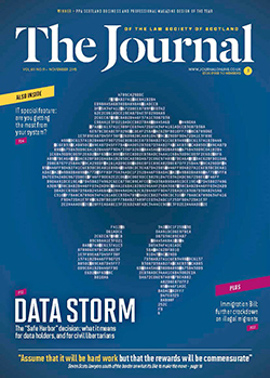As our suppliers see us

It would be a mistake to think that sophisticated processes for obtaining management information from client databases are the preserve of large firms with large databases. The software tools available to small practices are also well capable of distilling valuable data, both about clients and about the firm itself, as practices are increasingly coming to realise.
“Many firms are waking up to the fact that their practice management system is not merely a powerful process management machine,” comments Warren Wander, managing director at LawWare. “It also has the built-in capability to provide powerful work and matter management and financial control information at the press of a button. At any given time, reports can be generated to establish matter progress, WIP status, business profitability and a whole host of others. The trend is clear – more management information and greater control of the business is becoming one of the key components of the package.”
Thomson Reuters highlights the critical role legal technology is playing in delivering the increased profit per fee earner that the NatWest 2015 financial benchmarking report on law firms identifies as a key area of focus for law firms. “Most large law firms are already using modern software systems, such as matter management, to drive efficiency savings,” observes Chris Jeffery, director of small and medium law firms at Thomson Reuters. “This technology has, however, often been beyond the reach of many smaller firms. That is no longer the case. Smaller law firms and solo practitioners can now benefit from purpose-built matter management software that is available at a lower cost thanks to cloud technology.”
Practices are probably familiar with the basic tools of the software – document management, templates, email integration and storage, built-in security features and integrated accounting – as well as the savings in office space and the ability to work flexibly and remotely. But as Wander puts it, “While your practice management system is being used to efficiently control workflow and provide high quality service to your clients, a whole wealth of client data mounts up and can be put to good use.”
Chris Boulter, Thomson Reuters’ head of workflow, argues that matter management systems could be key also to enabling smaller firms to stay competitive with new entrants to the market, along with established larger firms.
Such competitors, he comments, are well aware of the importance of consistency of service levels, timeliness and a unified customer experience to client retention and repeat business. “In an age where consumers expect to do the major part of their business online, matter management systems make it easier for today’s smaller law firms to meet this demand,” he continues. “Not only do they handle emails, they also allow the sharing of legal documents in the cloud directly with clients, ultimately helping to enhance the client’s experience of dealing with the firm.”
Relationship building
As practices come to realise this, Wander reports, they are looking for enhanced support from their IT supplier. “Over the last few years, we at LawWare have witnessed a slow but perceptible change in the requirements of our legal clients. With fully integrated systems now the norm, partners, practice managers and financial managers are looking not just at exploiting the software more fully, but also at the service offering as a whole.
“This change of emphasis is most obvious in three key areas: reporting, client relationship management and, most importantly, after-sales service from their software supplier.”
In view of the demand for training, both on a structured basis at the initial stage and ongoing on the more advanced aspects of the system, LawWare is now planning to establish the “LawWare Academy”.
Wander adds that lawyers themselves are becoming more likely to learn how to use the client relationship management modules of their systems. “Simply managing the existing workload is no longer enough and, increasingly, lawyers are keeping an eye on the future profitability of their businesses by using client data to market and cross-sell additional services. We foresee that this trend will continue upwards over the coming years.”
Jeffery recognises that while smaller firms have less need of the “turning data into knowledge” aspect of data analysis than their larger counterparts, “Matter management systems such as Thomson Reuters Firm Central are capable of providing an excellent overview of the matters that are in progress with clients, what organisations and third parties are being dealt with regularly across the firm, as well as time-saving conflict checking tools.”
Wander explains that the key change in the market, driving the demand for training, is client expectations: “Client relationship management is also driven by clients themselves and, as technology gathers pace, more and more law firms are expected to provide online case updates. The era of the compulsory client portal is well and truly here for firms of all sizes.”
Boulter predicts “a very exciting future” for law firms if matter management systems are combined with legal information. “They can start to create relationships between their firm’s matter and other legal information to deliver the right guidance, documents, cases and legislative updates directly at the point of need, and even to monitor statutory changes against ongoing matters. In the future, we can expect legal technology to proactively recommend approaches and documents. If we achieve this, then matter management is not simply about making the administration of legal practice more efficient, it offers the prospect of streamlining the delivery of the legal tasks themselves.”
Wander concludes: “Instant fixes are no longer enough, and practices throughout the UK are seeking holistic solutions and long-term business partnerships. Techno-fashion fads aside, it will be the nimble and responsive PMS suppliers who will win the day.”
In this issue
- Appropriate adults and defence agents: who does what?
- Buying from a housing association: why consent matters
- Harassment: a civil claim?
- A welcome abroad: EYBA in London
- Reading for pleasure
- Opinion: David Faith
- Book reviews
- Profile
- President's column
- ScotLIS gets the green light
- People on the move
- Storm over Safe Harbor
- Light on a murky world
- Southern horizons
- Mediation minefield
- Migrants: no way to turn?
- The technological edge
- As our suppliers see us
- More rules to grapple with
- Fraud and divorce – a Scottish Sharland?
- What future for employment tribunal fees?
- Heading for a showdown on hard won human rights?
- Taxing question of relief
- Scottish Solicitors Discipline Tribunal
- How far can we rely on the register?
- All part of the game
- Law reform roundup
- From the Brussels office
- Poverty: a new front in the war
- Damage limitation: working it out
- Ask Ash
- A lawyer's lament
- Appreciation: Michael Scanlan






